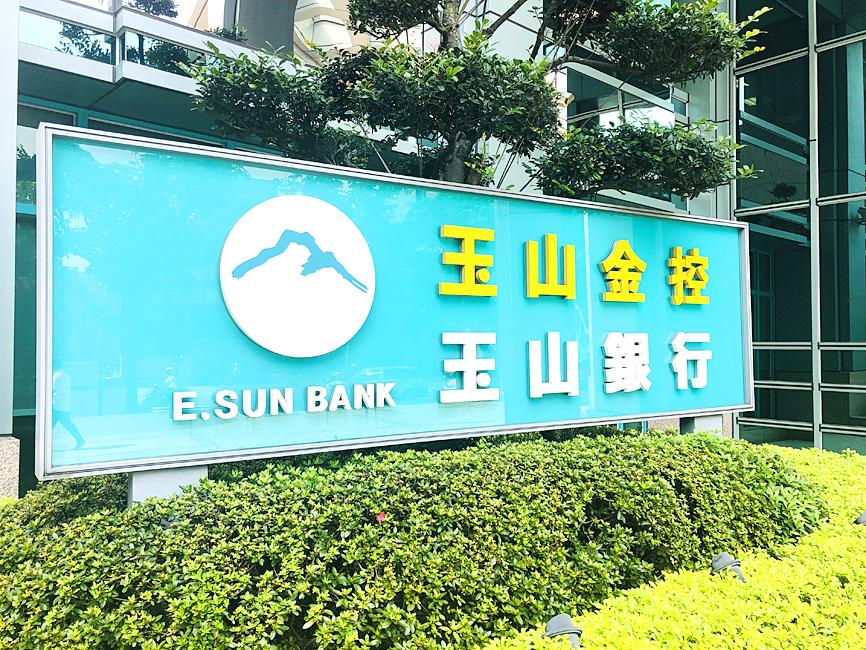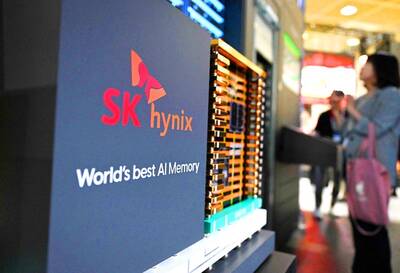The Financial Supervisory Commission (FSC) yesterday fined E.Sun Commercial Bank (玉山銀行) NT$20 million (US$693,698) over a theft scandal and punished the bank’s two top executives.
A customer relationship manager surnamed Pan (潘) at the bank’s branch in Kaohsiung’s Fengshan District (鳳山) stole NT$140 million from 41 clients over the past seven years, the commission said.
Pan secretly transferred the stolen money to accounts belonging to her and her family members by using clients’ debit cards, passwords or documents that were stamped using the clients’ personal stamps between July 2013 and June this year, the commission said.

Photo: Kelson Wang, Taipei Times
The commission suspended Ben Chen (陳炳良), the bank’s deputy director and chief executive of the consumer banking division, and Louis Chang (張綸宇), head of the bank’s wealth management division, for three months for their poor supervision and failure to exercise solid internal controls, Banking Bureau Director-General Sherri Chuang (莊琇媛) said.
The fine is the biggest to be levied on a bank in a single case, as it was not E.Sun’s first offense, Chuang said, adding that the bank was fined NT$12 million in February after another manager stole NT$36 million from clients.
Unlike fines imposed on banks for similar scandals in the past, the commission gave E.Sun’s top executives a heavy punishment as the regulator aims to hold top executives accountable to maintain financial discipline, FSC Chairman Thomas Huang (黃天牧) said.
“People follow the example of their superiors… Our punishment for the two top executives is a warning to all banks,” Huang said.
The FSC spent two months investigating Chen and Chang to ascertain whether they were responsible for the breach, he said.
Chang, who oversees all customer relationship managers, did not set up an effective mechanism to detect irregular transactions between the relationship managers’ accounts and any associated accounts, which gave Pan an opening, Chuang said.
Although the bank has barred relationship managers from withdrawing cash or transferring money on behalf of their clients, the bank’s deposit and transfer division staff still helped Pan conduct the transfers, for which Chen was to blame as he oversees the division, Chuang said.
Besides the two top executives, the bank’s risk management department and audit department also need to improve their practices as they failed to detect the irregular transactions, she said.
E.Sun Bank’s BIS capital ratio would be reduced to 13.75 percent, from 14.02 percent, as the commission thinks that the bank has a higher risk than its current estimate, Chuang said.
E.Sun Bank is also likely to see its scores in the Taiwan Stock Exchange’s corporate governance assessment fall next year, which would likely affect its share price, the commission said.

Intel Corp chief executive officer Lip-Bu Tan (陳立武) is expected to meet with Taiwanese suppliers next month in conjunction with the opening of the Computex Taipei trade show, supply chain sources said on Monday. The visit, the first for Tan to Taiwan since assuming his new post last month, would be aimed at enhancing Intel’s ties with suppliers in Taiwan as he attempts to help turn around the struggling US chipmaker, the sources said. Tan is to hold a banquet to celebrate Intel’s 40-year presence in Taiwan before Computex opens on May 20 and invite dozens of Taiwanese suppliers to exchange views

Application-specific integrated circuit designer Faraday Technology Corp (智原) yesterday said that although revenue this quarter would decline 30 percent from last quarter, it retained its full-year forecast of revenue growth of 100 percent. The company attributed the quarterly drop to a slowdown in customers’ production of chips using Faraday’s advanced packaging technology. The company is still confident about its revenue growth this year, given its strong “design-win” — or the projects it won to help customers design their chips, Faraday president Steve Wang (王國雍) told an online earnings conference. “The design-win this year is better than we expected. We believe we will win

Power supply and electronic components maker Delta Electronics Inc (台達電) yesterday said it plans to ship its new 1 megawatt charging systems for electric trucks and buses in the first half of next year at the earliest. The new charging piles, which deliver up to 1 megawatt of charging power, are designed for heavy-duty electric vehicles, and support a maximum current of 1,500 amperes and output of 1,250 volts, Delta said in a news release. “If everything goes smoothly, we could begin shipping those new charging systems as early as in the first half of next year,” a company official said. The new

SK Hynix Inc warned of increased volatility in the second half of this year despite resilient demand for artificial intelligence (AI) memory chips from big tech providers, reflecting the uncertainty surrounding US tariffs. The company reported a better-than-projected 158 percent jump in March-quarter operating income, propelled in part by stockpiling ahead of US President Donald Trump’s tariffs. SK Hynix stuck with a forecast for a doubling in demand for the high-bandwidth memory (HBM) essential to Nvidia Corp’s AI accelerators, which in turn drive giant data centers built by the likes of Microsoft Corp and Amazon.com Inc. That SK Hynix is maintaining its